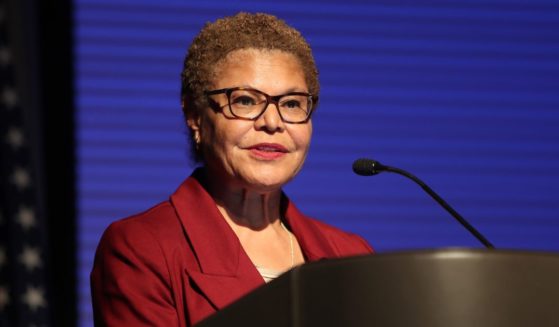Democrats' Worst Fear Is on the Horizon as a Massive 3rd Party Billionaire Moves Closer to Becoming a Candidate
After the 2000 election, Ralph Nader was pretty much exiled to cultural Siberia for the claim that his third-party run got George W. Bush elected. I mean, let’s face it, most younger liberals probably couldn’t have picked a man best known for killing the commercial prospects of the Chevrolet Corvair three decades prior out of a police lineup of two people, but now they knew who he was — and they loathed the man with the same intensity they loathed Dubya.
If Howard Schultz has anything to say about it, however, Nader’s place in the history books could finally revert to being the man who got a mediocre rear-engined GM economy car off the market.
If you’re not into business or the field of liberal activism, you also might not be able to pick Howard Schultz out of that two-person lineup. He’s the former CEO of Starbucks, having served two stints in that position and being the man most commonly associated with bringing the brand to worldwide prominence. He’s also a Twitter neophyte, having just sent out his first three tweets.
And wouldn’t you know it, two of them had to do with the possibility of him running for president:
It feels good to be here. My hope is to share my truth, listen to yours, build trust, and focus on things that can make us better.
— Howard Schultz (@HowardSchultz) January 27, 2019
I love our country, and I am seriously considering running for president as a centrist independent.
— Howard Schultz (@HowardSchultz) January 28, 2019
This moment is like no other. Our two parties are more divided than ever. Let’s discuss how we can come together to create opportunities for more people. #ReimagineUS https://t.co/9UY46OTO0I
— Howard Schultz (@HowardSchultz) January 28, 2019
It was at that auspicious moment that at least 13 potential Democrat presidential candidates called their doctor and asked for a Xanax prescription.
In an interview with The New York Times, Schultz told the newspaper “he was preparing to run for president as an independent and had already begun the groundwork required to be on the ballot in all 50 states.”
“We have a broken political system with both parties basically in business to preserve their own ideology without a recognition and responsibility to represent the interests of the American people,” Schultz said.
“Republicans and Democrats alike — who no longer see themselves as part of the far extreme of the far right and the far left — are looking for a home,” he continued, saying he thought the answer to our problems lay beyond party politics. “The word ‘independent,’ for me, is simply a designation on the ballot.”
Here is Schultz making his statement to “60 Minutes” in an interview that aired Sunday:
In this respect, Schultz could definitely be a spoiler. Of the serious declared Democrat candidates — I’m assuming Rep. John Delaney of Maryland’s prospects are non-existent that Rep. Tulsi Gabbard of Hawaii’s are marginal at best — the most centrist among them is Sen. Kirsten Gillibrand of New York, who’s hardly centrist at all.
Former Vice President Joe Biden will almost certainly enter the race, but one assumes even he’s going to have to move further left than he was in the Obama administration in a primary season that will likely see activist voters dominate.
And there arises the problem with Schultz.
Yes, Schultz could theoretically attract conservatives who were reluctant Trump supporters in 2016, particularly depending on what Robert Mueller ends up presenting, whenever he presents it.
However, in a moment where American politics are deeply cultural, Schultz’s credentials come as the CEO of a company not entirely beloved by conservatives. Also, even in 2016 — back when prospects of Trump winning seemed dim and there was plenty of dissent within the GOP ranks, Evan McMullin and Gary Johnson couldn’t tap into that resentment to siphon off votes.
That brings us to the Democrats, who still seem to forget that what the base may want is fundamentally different from what the wider party will vote for.
“Already top Democratic operatives working for presidential candidates and beyond say they’re worried that the only thing he’ll accomplish is making sure Donald Trump gets re-elected,” Edward-Isaac Dovere reported in The Atlantic. “It’s more than just sniping at a prospective opponent; word that he might invest in an independent run has many of them clearly worried about how he’d split votes in a general election.”
“Trump’s strategy has always been divide and conquer, and this plays directly into his hands,” an anonymous Democrat strategist told Dovere. Schultz is “Ralph Nader without any of Nader’s redeeming qualities. What’s his value proposition for America? Make America like a corporate chain?”
Schultz’s value proposition may be that he’s not whoever the Democrats nominate. Remember, the party’s success in 2018 was partially built on activist voters and the tendencies of midterm elections to bring out voters who oppose the president. However, one key to Democrats’ retaking the House was fielding moderate candidates in suburban districts where antipathy toward Trump ran high.
Can Democrats sell Elizabeth Warren to these voters? Bernie Sanders?
Maybe if the other candidate is Trump and the Democrats’ entire campaign is solely about the perfidies of the Trump administration, sure. But if those newly minted Democrat voters are given a legitimate third-party challenger that’s none of the above and peddles himself as a centrist who isn’t reflexively anti-business and has a chance of winning, that strategy would necessarily be thrown out the window.
Schultz, 65, is worth $3.3 billion. Campaigns are expensive nowadays, but that’s enough money to make a significant dent, particularly if you’re a Ross Perot type who comes to the late-life conclusion that just being known as a CEO isn’t enough to ensure your legacy.
If the former CEO decides he wants to blow, say, a fifth of his fortune on a delusional, quixotic bid for the presidency, I can see him easily see him in double digits — if perhaps not in the White House.
The problem for the Democrats is that not much of that support is going to siphon off from Trump. And while 2000 had Democrats forcing Ralph Nader out of the public sphere, 2020 could get them to try and force Howard Schultz out of the country.
Truth and Accuracy
We are committed to truth and accuracy in all of our journalism. Read our editorial standards.
Advertise with The Western Journal and reach millions of highly engaged readers, while supporting our work. Advertise Today.












